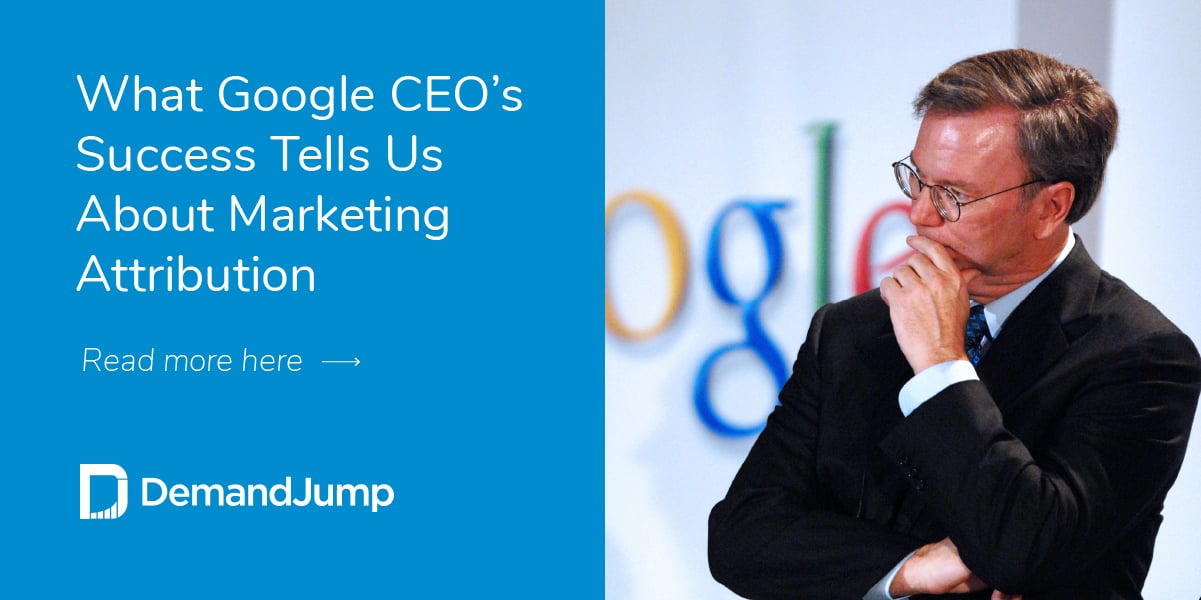What Google CEO’s Success Tells Us About Marketing Attribution
March 23, 2020 •Jared Owens

Eric Schmidt is one of the world’s richest people. He has a net worth of about $14.7 billion dollars in early 2020, and has run one of the most powerful advertising and search engines in the world, Google (Alphabet).
Since his business is all about data, search optimization, and advertising spend, what can we learn about his life as it relates to marketing attribution models?
A little about Eric:
- Born in (1955)
- Pedigree (son of an economist)
- Experiences in a global world (lived in Italy)
- Educated (BS in Electrical Engineering and PhD in Computer science)
- Worked in computing in a time when it was just becoming commercialized (1980s)
- Good friends (Scott McNealy, Sun)
Articles have been written about how being at the right place at the right time made him successful. Both he and Bill Gates were born in 1955. Others have said he was groomed by some of the best companies in the world. He worked at Xerox and Sun Microsystems early in his career, before moving on to become CEO of Novell in 1997 and Google in 2001. You could also argue that having well-educated parents, not being saddled with debt of education, and living experiences when he was young shaped his rise.
Or, was it his intelligence? His work ethic? His ability to sell himself?
The fact is, it is probably a combination of all of the above, as well as some other external factors that cannot be measured. For instance, he was never in a fatal car accident, he was in a growing and ripe industry for change, and was never part of something debilitating that was out of his control. As he has mentioned on record, he did have some luck.
The same is true for marketing attribution. There are many factors that influence a consumer’s purchase. So, how do we decide which factors contribute most??
The answer lies in 2 things:
- Your model will not be perfect. Just as the above example with Eric Schmidt, each of these steps in his life’s journey contributed to his success. But the precise numbers must be measured over time, across many entrepreneurs to guide any type of actionable trends.
- Building a sound data model can tell you infinitely more than guessing. Each step in the path to purchase can yield insightful and actionable data insights to guide sound decisions on spend.

So, how do I build an effective marketing attribution model?
Measure your consumer touches.
You should start with the blocking and tackling of Google Ads, Bing Ads, Facebook, and Amazon. But, you must overlay that information with TV, Radio, phone calls, and print distribution. Finally, there are factors that are unique to your business, and that should have measurement as well.
For a company like Orkin pest control, all of these channels may come into play. The company invests in online advertising campaigns, but may also receive phone calls to directly order service. Everything from paper coupons sent in mail flyers to TV ads that may or may not be watched can influence behaviors. The key is to measure that things are happening, when they are happening, and in what regions they are happening to assess impact.
Account in your model for brand equity and pricing promotions and adjustments.
Not all companies are on a level playing field. From the above example, Orkin pest control will have a name brand advantage over local vendors and also probably have more price promotions.
Pricing can have a 20-25 times greater impact on sales than the total effect of all other advertising. It is furthermore important for a company like Apple to understand that they will receive the pick of the first touch litter on brand name recognition alone.

Empirically arrive at an attribution data model that works for your business.
As with Apple and Orkin above, there are differences based upon the business you are in. The attribution model chosen should reflect your unique business. It is not a one-size fits all game of marketing attribution.
A great example of the different types of attribution explained are listed here. Practice running your spend through different models to see if there is a correlation between increases and decreases and your overall success criteria. Remember, there is a difference between correlation and causation; so, pay attention to the numbers and use your head.
You should seek a vendor who can present multiple attribution models and allow you to analyze what works for your spend, your sales patterns, and most importantly, your consumer’s behaviors.
Featured Articles
Categories
- Attribution Tracking (13)
- Channel Optimization (11)
- Consumer Insights (68)
- Content Marketing (251)
- Data Science (8)
- Digital Marketing (6)
- Digital Transformation (26)
- Enterprise (10)
- Lead Generation (14)
- Market Intelligence (8)
- Marketing Analytics (39)
- Marketing Attribution (57)
- Marketing Management (153)
- Marketing Operations (86)
- Organic Search (222)
- Paid Search (52)
- Pillar-Based Marketing (63)
- Programmatic Advertising (9)
- SaaS Content (14)
- SaaS Marketing (29)
- Search Marketing (111)
- SEO Keyword Research (28)
- SEO Pillar (18)
- SEO Strategy (46)
- SMB (5)
- Website Content (12)


